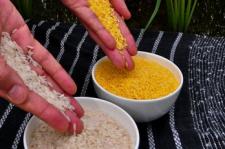Aggregated News

The Philippines has approved GMO golden rice for commercial production. This is in spite of the fact that no independent data on the safety of this GMO for health and the environment have been published; that beta-carotene, which the rice is engineered to contain, is one of the commonest molecules in nature and numerous native plants contain high levels; and that the US FDA says that GMO golden rice doesn't contain enough beta-carotene to justify a health claim.
As Glenn Davis Stone and Dominic Glover point out, it is still unknown if the beta-carotene in GMO golden rice can even be converted to Vitamin A in the bodies of badly undernourished children. In addition, research shows that what beta-carotene there is in the rice degrades rapidly in storage. Cooking further degrades the beta-carotene.
Meanwhile, as the development of golden rice creeps along, the Philippines has managed to slash the incidence of Vitamin A deficiency by non-GMO methods.
The author of the France24 article below is clearly ignorant of these crucial facts.
1. Philippines approves GMO 'golden rice'...



